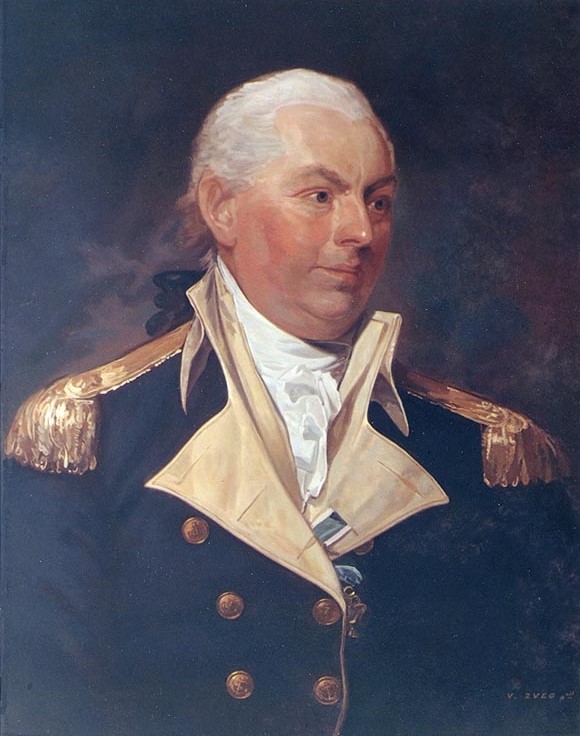Commodore John Barry USN |
|
(1745-1803) |
 |
Portrait of Commodore John Barry by V. Zveg.
|
Born in Wexford, Ireland, in 1745; died in Philadelphia, 13 September 1803. John Barry followed the sea from childhood, and at the breaking out of the hostilities between England and the Colonies, offered his services to Congress. His ship the Black Prince was purchased by the Government and named Alfred, in which John Paul Jones, as a Lieutenant, first hoisted the American (Grand Union) Flag.
Captain Barry was given command of Lexington, of 14 guns, on 7 December 1775. The Lexington sailed 31 March 1776. On 7 April 1776, off the Capes of Virginia, he fell in with the Edward, tender to the British man-of-war Liverpool, and after a desperate fight of one hour and twenty minutes captured her and brought her into Philadelphia . Barry continued in command of Lexington until 18 October 1776, and captured several private armed vessels during that time. His next command was the Effingham, to which Congress had appointed him on 6 June 1776 while she was being built. On this ship he was actively and successfully employed guarding the Delaware Bay and Capes. On 10 October 1776 Congress established the relative rank of officers of the Continental Navy and placed the name of John Barry No. 7 on the list of captains. December 1776. Barry, having recruited a company of volunteers for land service, took part in the Trenton campaign. These volunteers and the marines cooperating with them were commended by General Washington. Barry acted as an aide to General Cadwalader, and was sent on several occasions as a bearer of important dispatches. His next duty was assisting in the defense of Philadelphia and operations in the upper Delaware. When the British took possession of Philadelphia in September 1777, Captain Barry was ordered to take the uncompleted Continental frigate Effingham up the Delaware River to a place of safety. In October, the ship was ordered sunk or burned. She was sunk on 2 November, near Bordentown, New Jersey, to deny her use to the British. 7 March 1778. He captured the armed schooner Alert of 20 guns, and two ships loaded with supplies for the British Army. Barry next commanded the Raleigh, 32 guns. He sailed from Boston 25 September 1778, and two days later was chased and attacked by three of his Brittanic Majesty's vessels. After a nine hours running fight, he was obliged to run the Raleigh ashore on an island near the mouth of Penobscot Bay, but escaped to the mainland with most of his crew. Though he lost his ship, he was highly commended for the gallantry. The privateer Delaware of 10 guns was the next ship assigned to Captain Barry. In November 1780, Barry was ordered to command the Alliance, 32 guns, and took John Laurens, Special Commissioner, to France. Owing to the difficulty in obtaining a crew, this ship did not sail until 11 February 1781. On the passage to France, she captured the Privateer Alert of 12 guns. On the return voyage the Privateer Mars, 26 guns; and Minerva, 10 guns were made prizes. 29 May 1781. After several hours fighting, Barry captured H.B.M.S. Atlanta, 20 guns, and later the Trepassy, 14 guns. During the engagement with the Atlanta, Barry was wounded. He continued in command of the Alliance, capturing numerous prizes in 1782. March 1783. The last Naval engagement of the Revolutionary War was fought by Barry in the Alliance against the British man-of-war Sybylle of 28 guns. Though the ship surrendered to him he was obliged to abandon it to escape from the rest of the squadron of which she was a part. At the time of the fight with the Sybylle, Barry was convoying the Duc de Lauzane, carrying money and supplies from the West Indies to the United States. His action enabled her to escape and reach port safely. Following the end of the Revolutionary War in 1783, Barry returned to the merchant service. In 1794 he was appointed the senior Captain of the newly established United States Navy and subsequently was in charge of constructing the large frigate United States. Captain Barry commanded the new ship in the West Indies during the 1798-1801 Quasi-War with France, including a period as Commodore of U.S. Navy forces in the region. He served ashore at Philadelphia for the remainder of his life. Commodore John Barry died there on 13 September 1803. |
(Text and photo courtesy of the USNHC)
|
USS Barry DD-248 |
||
Page published Jan. 9, 2008 |